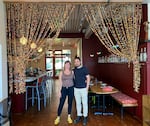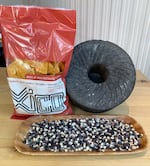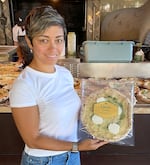The restaurant business has always been full of uncertainty. Decades before the pandemic, research found that more than half of new restaurants failed within three years of opening. Anyone who has worked in the industry knows the hours are long, the work can be grueling and profit margins are thin.
Now the ongoing pandemic has led many restaurants to shut their doors for good. In Portland alone, a running tally now lists more than 200 restaurants that have closed in the past two and a half years.
For those chefs, bar owners and restaurateurs that have stayed open, many have had to pivot their operations: High end restaurants reconfigured their menus to offer heat-at-home family meals, bars pushed the Oregon Legislature to legalize to-go cocktails, and some even found success in making the shift to packaged foods.
“That trickle of revenue from a packaged product has helped us stay afloat through the pandemic,” said Liz Davis, the founder and owner of Xico restaurant.
The upscale Mexican restaurant opened in 2012 and is one of only a handful of restaurants in the U.S. that grinds its own corn in-house to make masa.
“We have a Molino, which is a volcanic stone corn grinder,” said Davis. “We nixtamalize and grind organic, non-GMO field corn that we use for all of our tortillas, chips and masa-based products.”
When Xico shut its doors to in-person dining in March 2020, it had two locations and a staff of 70 people. Within a week, they were down to a staff of five and pivoted to creating meals to-go. Their robust mailing list gave them a direct line to customers and for the next year and a half, Xico created and sold family style dishes meant to be reheated at home. They also offered packaged salsas, corn tortillas and housemade chips. “It was definitely very experimental at the beginning,” she said.
A break came after Davis submitted Xico’s chips to local grocery chain New Seasons Market, which brought them on at all 18 of its store locations.
“It was just my sous chef and I frying hundreds and hundreds of bags of chips, packing them, and figuring out how to get them to where they needed to go.”

Liz Davis, the founder and owner of Xico restaurant, stands with sous chef Jamil Aguilar. Throughout the pandemic, the pair cut, fried and packaged their tortilla chips by hand to sell to local stores.
Crystal Ligori / OPB
The decision to focus on chips for the retail market rather than other products was strategic. Davis said it was simply more complicated to sell perishable products in a grocery setting than something shelf stable.
But going from restaurant owner to packaged food maker is not a simple task. A second grocer called Market of Choice was interested in Xico’s chips and invited Davis to participate in “Oregon Angel Food,” a three-month education program developed by the nonprofit Oregon Entrepreneurs Network. The program is two fold: offering both education and networking in the realm of packaged foods, but also offering one year of shelf space at Market of Choice once their products are ready.
“I learned so much [and] met so many people,” said Davis, who noted that they’ve already outgrown their restaurant space as a production facility for the chips.
Xico is in the process of expanding its chip production and bringing on a second flavor via another local company called Community Co-Pack NW.
Going forward, Davis sees the packaged chips working in tandem with the restaurant to support one another.
“I do think that the seasonality in the packaged food world is maybe opposite of the seasonality in the restaurant business, so they can support each other during slow periods,” she said. “That will obviously help the bottom line and help us stay in business.”

Mexican restaurant Xico used a volcanic stone corn grinder called a Molino to grind the masa for its housemade chips.
Crystal Ligori / OPB
For Eugene Jung, co-owner of the ping pong bar Pips & Bounce, the pandemic brought an immediate halt to his business, with no real option to pivot.
“It was probably one of the worst brick and mortar businesses that you could own in the pandemic because you’re close to people and you’re playing ping pong,” said Jung.
The bar had seen a run of success in the six years they were open before the pandemic: a write up in the New York Times, an appearance on Shark Tank, and a second location about to open in Minneapolis.
“We actually were having a viewing party of our Shark Tank appearance with 50 or 60 people and we had a local news crew [there],” said Jung. “The videographer got a cell phone call during the viewing party and he was like, ‘I apologize, but I have to go because [Oregon] just got our first COVID case.’ They had to pack up, they left, and probably within 10 days we shut down.”
Jung had been running full speed with his focus on Pips & Bounce and said that while he was upset when they closed, he knew it wasn’t healthy for him to just wallow in the anger. While checking in on his employees on their shared Slack channel, he saw one mention that the Amazon fulfillment center was hiring.
“I thought about it, like ‘You know what? It gives me something to do as opposed to just sitting at home.’”
Jung was hired as a ‘picker’ and the work he said could be back-breaking. “It was kind of a crazy job because you literally pick like a thousand items a shift,” he said. “You can pick items as light as Chapstick or as heavy as a 50-pound bag of dog food.”
Within the first few weeks of working, Jung started to notice a pattern emerge. Many orders fell into two categories: pet food or coffee.
“If this is what people are ordering at hopefully the worst crisis of humanity in our lifetime… it was kind of an epiphany.”
Without knowing if or when Pips & Bounce would reopen, Jung started his research. He said it took almost no time to figure out he didn’t want to make pet food, but roasting coffee had a fairly low barrier of entry for a new business. Especially for someone who had a 4,500 square foot building with a commercial kitchen that was sitting unused.
“So I was like, ‘OK, I can repurpose Pips & Bounce for the time being and just learn how to roast coffee.’”
He also had another benefit on his side — lots and lots of time to learn. Roasting coffee he said is an art, not a science equation, so much of the process was trial and error. Initially, he wasn’t confident in his roasts, but as the pandemic continued, he knew he had to go all-in.
“Like many small businesses or entrepreneurs, you just kinda have that leap of faith,” he said.
The first customers of Skaut Coffee Roasters were friends and family, but Jung knew expanding into the grocery world needed to be his next step. With many cafes, bars and restaurants still closed or limited to take out, grocery stores still had a built-in clientele.
“That was kind of the revelation once I got into my first grocery store, I’m like ‘OK, I’m all in on this’,” he said.
Through other small business owners, Jung also connected with the Oregon Entrepreneurs Network, getting education and retail space through their program. He was one of two new business owners recognized this year with the Emerge Initiative award, a $5,000 grant gifted by The BFM Fund designed to support entrepreneurs of color in the early stages of business development.
While Pips & Bounce has now reopened, Jung says Skaut Coffee isn’t going anywhere.
“Coffee roasting is a growing business for me,” he said, “So I actually have a foot in both businesses and I’m keeping myself very busy.”

Chef Sandra Arnerich holds up a par-baked Bianco Verde pizza from Renata. She and her husband, Nick, created the frozen pizza line during the pandemic for their pantry program. They've now shuttered the restaurant to focus all their energy on the pizza business.
Crystal Ligori / OPB
“The restaurant business is hard,” says Sandra Arnerich, the chef-owner of Renata. “And I don’t ever want to sugarcoat it because I think it would be a disservice for people that are in it.”
The wood-fire, Italian restaurant that she owned with her husband, Nick, made waves almost as soon as it opened, grabbing the title of “Restaurant of the Year” in 2015, just six weeks into service. A year later the pair started sister café, Figlia, and a third location had just opened weeks before the start of the pandemic.
The same week Oregon Gov. Kate Brown had instituted a statewide stay at home order, Renata was set to receive a full cow from a local farm.
”My first thought was like, ‘We don’t have a restaurant, we can’t take this cow!’,” said Arnerich. But with the farmers already en route and the animal already slaughtered, she decided to accept the meat and “figure it out.”
That was on a Monday, by Thursday, Renata already had a to-go, pantry program in place. They had so much inventory from the restaurant, that they decided to funnel everything into a program designed to provide food that was affordable that would feed a family.
“We’re parents too,” said Arnerich. “Our struggle was the same struggle that everybody was going through. Nobody wants to go to grocery stores, everybody’s homeschooling, everybody’s working from home and people are going to need food.”
That original idea morphed throughout the following weeks and months because things were changing so rapidly. People became more comfortable going to the store again, but indoor dining was still a no-go. Sandra’s husband Nick proposed revamping and freezing the pizzas Renata used to make in the restaurant for a home consumer.
“We put them into our pantry program and we couldn’t keep them [in stock].” she said. “People would buy six of them at a time.”
By then, supply chain issues had already begun to change what supermarkets had in stock. Arnerich said she noticed New Seasons Market was struggling to fill their shelves now that many of the products that were coming in were pandemic necessities like toilet paper. So they approached the grocer to see if they would be interested in carrying Renata’s pizzas.
“They said ‘Can you deliver 3,000 pizzas in three weeks?’ And I want you to understand that when we had the restaurant, we thought we could only bake two pizzas at a time in our oven,” she said.
Not only did they make 3,000 pizzas, they also created the branding, packaging and labels for them. For the first two years Renata’s pizzas were available in stores, they were the No. 1 and No. 2 best selling frozen products the grocer carried.

Par-baked pizzas cooling on a wire rack in Renata restaurant in Southeast Portland. The pizzas will be packaged and frozen for resale in local grocery stores.
Crystal Ligori / OPB
What started as the answer for how to keep the restaurant alive during the pandemic, has now transformed into its own successful product line.
“It really has reshaped how we’re moving forward as a business.” she said. “Walking away from this is not an option for us.”
After the return of indoor dining, Renata was doing double duty, as both a pizza manufacturer and a restaurant, but things were still a challenge. Beyond taking a hit during the pandemic, everything from hiring staff to the desirability of their location had now changed.
“Being back for daily operations of a restaurant is three times harder than it was pre-pandemic,” Arnerich said. “And it was already really hard [before that].”
Last month, Renata quietly shuttered the restaurant, posting on social media that they’ve decided to put all their energy into their frozen pizza line.
They’ll still host private events in the old restaurant space. But Arnerich said: “The pizza business is a really great way to keep doing what we love to do, [but] do it in a different setting.”



